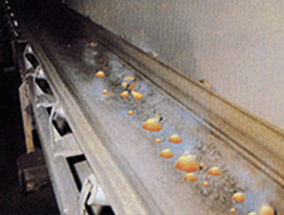How Rubber Conveyor Belts Enhance Efficiency in Production Lines: A Comprehensive Guide
Published:
May 04,2025
Classification:
Discover the transformative role of rubber conveyor belts in production lines. Learn how these essential components boost efficiency, reduce downtime, and enhance productivity across various industrie

How Rubber Conveyor Belts Enhance Efficiency in Production Lines
Table of Contents
1. Introduction to Rubber Conveyor Belts and Their Importance in Industries
2. Types of Rubber Conveyor Belts: A Detailed Overview
- 2.1 General Purpose Rubber Conveyor Belts
- 2.2 Specialized Rubber Conveyor Belts
3. Benefits of Using Rubber Conveyor Belts in Production Lines
- 3.1 Enhanced Operational Efficiency
- 3.2 Cost-effectiveness in Production
- 3.3 Improved Safety Standards
4. Common Applications of Rubber Conveyor Belts in Various Industries
- 4.1 Manufacturing and Assembly Lines
- 4.2 Mining and Bulk Handling
5. Maintaining Rubber Conveyor Belts for Optimal Performance
- 5.1 Regular Inspection and Maintenance Practices
- 5.2 Repairing Common Issues with Conveyor Belts
6. The Future of Rubber Conveyor Belts in Industry
7. Conclusion: Embracing Rubber Conveyor Belts for Enhanced Efficiency
8. FAQs: Common Questions About Rubber Conveyor Belts
Introduction to Rubber Conveyor Belts and Their Importance in Industries
In the ever-evolving landscape of industrial production, efficiency is paramount. One of the unsung heroes that contribute significantly to enhancing this efficiency is the rubber conveyor belt. These robust and versatile belts are integral to various production lines, seamlessly transporting materials and products across different stages of manufacturing. Their ability to withstand the rigors of heavy loads, coupled with their adaptability to diverse environments, makes them indispensable in industries ranging from manufacturing to agriculture.
Rubber conveyor belts not only facilitate the smooth movement of goods but also play a crucial role in minimizing downtime and reducing operational costs. By optimizing the flow of materials, businesses can enhance productivity and streamline their operations.
Types of Rubber Conveyor Belts: A Detailed Overview
Understanding the different types of rubber conveyor belts available in the market is essential for selecting the right one for your specific needs. These belts can be categorized based on their construction, purpose, and application.
General Purpose Rubber Conveyor Belts
General-purpose rubber conveyor belts are designed for basic applications across various industries. These belts are typically used for handling materials such as grains, pellets, and packaged goods. Their construction allows for flexibility and durability, making them suitable for a wide range of environments.
Specialized Rubber Conveyor Belts
Specialized rubber conveyor belts are engineered for specific applications that require enhanced features. These may include heat-resistant belts for high-temperature environments, oil-resistant belts for handling greasy materials, and chemical-resistant belts for industries dealing with hazardous substances. Choosing a specialized belt can significantly impact the efficiency and safety of production lines.
Benefits of Using Rubber Conveyor Belts in Production Lines
Rubber conveyor belts offer numerous advantages that contribute to the overall efficiency of production lines. Here are some of the key benefits:
Enhanced Operational Efficiency
Rubber conveyor belts are designed to operate continuously and efficiently, ensuring a smooth flow of materials. Their high load-carrying capacity allows businesses to transport large quantities of materials simultaneously, which reduces the time taken for production processes.
Cost-effectiveness in Production
Investing in rubber conveyor belts can lead to significant cost savings over time. Their durability means less frequent replacements and repairs, while their ability to minimize downtime helps to avoid costly production delays. Moreover, efficient material handling reduces labor costs, further enhancing the overall return on investment.
Improved Safety Standards
Safety is a critical concern in any industrial setting. Rubber conveyor belts improve workplace safety by minimizing manual handling and reducing the risk of injuries associated with lifting heavy loads. Additionally, the use of conveyor belts helps maintain a clean work environment, reducing hazards related to spills and clutter.
Common Applications of Rubber Conveyor Belts in Various Industries
Rubber conveyor belts are versatile and find applications across a multitude of industries. Here are some common uses:
Manufacturing and Assembly Lines
In manufacturing, rubber conveyor belts facilitate the transportation of parts and products through assembly lines. Their ability to be customized in terms of length, width, and surface texture allows them to cater to specific needs, enhancing the efficiency of the assembly process.
Mining and Bulk Handling
In the mining industry, rubber conveyor belts are essential for moving bulk materials like coal, ore, and aggregates over long distances. Their robustness and resistance to wear and tear make them ideal for handling heavy and abrasive materials, ensuring efficient operations in challenging environments.
Maintaining Rubber Conveyor Belts for Optimal Performance
To ensure that rubber conveyor belts perform at their best, regular maintenance is crucial. Proper care can significantly extend the lifespan of these belts and prevent costly breakdowns.
Regular Inspection and Maintenance Practices
Regular inspections should be conducted to check for signs of wear, alignment issues, and any potential damage. It is essential to maintain proper tension in the belts to prevent slippage and optimize performance. Additionally, keeping the conveyor system clean from debris and materials can help avoid unnecessary strain on the belts.
Repairing Common Issues with Conveyor Belts
Despite best maintenance practices, conveyor belts may encounter issues such as fraying, cracking, or misalignment. Addressing these problems promptly through professional repairs or timely replacements can prevent more significant operational disruptions.
The Future of Rubber Conveyor Belts in Industry
As industries continue to evolve, so does the technology behind rubber conveyor belts. Innovations in materials and design are paving the way for even more efficient and sustainable conveyor systems. Advanced monitoring systems equipped with sensors can provide real-time data on performance, enabling proactive maintenance and further enhancing operational efficiency.
Conclusion: Embracing Rubber Conveyor Belts for Enhanced Efficiency
In conclusion, rubber conveyor belts play a pivotal role in enhancing the efficiency of production lines across various industries. Their versatility, durability, and cost-effectiveness make them an essential investment for businesses aiming to optimize their operations. By understanding the different types of rubber conveyor belts and their applications, industries can significantly improve productivity and safety while reducing operational costs. As we look to the future, the continued innovation within this field promises even greater advancements, ensuring that rubber conveyor belts remain a cornerstone of industrial efficiency.
FAQs: Common Questions About Rubber Conveyor Belts
1. What are the main advantages of rubber conveyor belts?
Rubber conveyor belts offer enhanced operational efficiency, cost savings, improved safety standards, and durability, making them a preferred choice in various industries.
2. How often should rubber conveyor belts be inspected?
Regular inspections should be conducted at least once a month, or more frequently based on the intensity of use and the operating environment.
3. Can rubber conveyor belts be customized for specific applications?
Yes, rubber conveyor belts can be customized in terms of length, width, and surface texture to cater to specific needs and applications.
4. What maintenance practices help extend the lifespan of rubber conveyor belts?
Regular inspection, proper tension maintenance, cleaning of debris, and prompt repairs of any issues are essential practices for extending the lifespan of rubber conveyor belts.
5. Are there specialized rubber conveyor belts for high-temperature environments?
Yes, specialized rubber conveyor belts are available that are designed to withstand high temperatures, as well as belts that are resistant to oils and chemicals, depending on the application's requirements.





